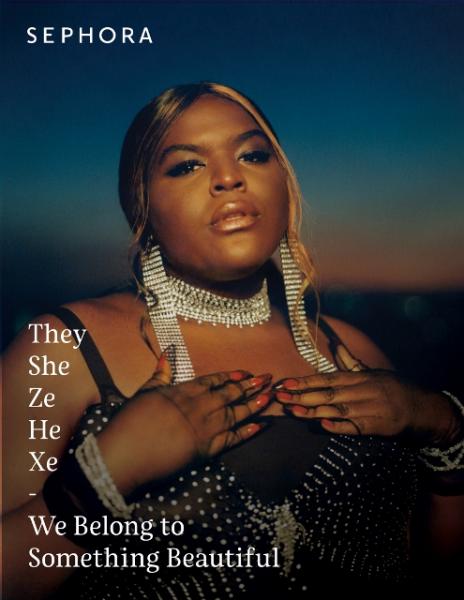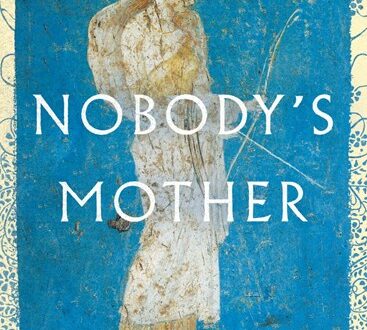
Sephora Transgender Ad: “We belong to something beautiful”
If we could sit down for coffee I'd ask some questions…
Walking down the mall last week I saw this large poster in the Sephora makeup retailer window. It was the end of June, gay pride month, and of all the messages I’d seen celebrating LGBT I found it the most riveting.
I continued on to my car, but the poster haunted me. I live in Columbia, South Carolina, not exactly a hotbed of LGBT activism. But here was this poster in our neighborhood mall going beyond asking for acceptance for transgendered people. It went beyond celebration of diversity. It made a strong moral statement: Transgender is beautiful.
When it is July hot and 150% humidity, I walk for exercise in the mall. So a few days later I was back, approaching the store and considering whether to talk with the manager. I reached the store and searched the windows. No poster. I entered and who should greet me but…the manager. She welcomed me with a friendly smile.
“Can I help you?” she asked.
“Hello,” I said. “Yes, last time I passed by you had a poster in your front window that said, ‘We belong to something beautiful.’ I noticed that today it’s gone…”
“Yes,” the manager responded, “we passed the end of the month and we always change them after a month.”
“I’ve wanted to tell you that I’ve really been thinking about your poster and its message.”
“Oh?” she looked at me with genuine interest.
“We certainly agree that all LGBTQ people should be treated with love and acceptance. I believe that we are all created in the image of God. That each one of us is worthy of great respect and kindness.
She smiled and said, “Yes, that is our message.”
I nodded and slowly continued, “But do you see that Sephora is going beyond appealing to us to be kind and inclusive in the way we treat people? You’ve made a moral statement that transgender is beautiful.”
I liked the manager. She listened with empathy and good will and didn’t become defensive. I wished I’d had the opportunity to take her to coffee and discuss transgender. Encourage her to ask me questions too.
I went home and looked up Sephora’s website. I understand that they are trying to reach out to a group that is often troubled and needs encouragement: 41% attempt suicide. Even those who have had transition surgery are 19 times more likely to die by suicide. Transition surgery helps many feel better for a while, but within 10 years or so many again struggle with depression, anxiety and suicide.
Is it because our culture has disapproved? The evidence says no. Even in countries that have been LGBT-affirming for decades (Netherlands, Sweden, France etc.) we see similarly high statistics among LGBTs for suicide and suicide ideation as well as depression and anxiety. How, we gently ask, is this beautiful?
On their website I watched the Sephora campaign film celebrating “diverse gender expression.” It included images of two children, one in drag. I would sincerely have liked to talk with the store manager about her response. What she might think about kids who have a history of depression and anxiety being shepherded with Affirmative Care—the new approach in counseling that simply affirms any child’s desire to change their gender. Even though research shows that after puberty 80-95% will settle into their biological sex if they are allowed to develop normally.
What might she think about these kids spending 45 minutes discussing their feelings with a counselor who then refers them to a sex change clinic for hormone therapy? I think of all the stories of parents I’ve read who desire to get their kids into longer-term therapy to deal with root causes of gender dysphoria who are being shut down by the courts and legislation outlawing gender conversion therapy.
I think of the painful surgeries that many will choose to suppress the male or female DNA in every cell in their bodies: bilateral mastectomies, penile construction, hysterectomy, chin, cheek and jaw reshaping, thyroid cartilage enhancement to construct an Adams apple, or Adams apple reduction…the list is long. As anyone may remember who read the best-selling Midnight in the Garden of Good and Evil, Lady Chablis, the real-life drag queen featured in the book, rode the raging hormone injection roller coaster at great personal cost. Is fighting your body like this a beautiful way to live?
What does she make of the social contagion factor where friends come out to their school counselor together and ask for help changing their names and genders and seeking referrals to sex change clinics together?
I’ve heard and read many stories of moms weeping over the daughter they birthed and named and loved and who must now come to grips with the new reality: they have lost their daughters. They now have a son, sending shock waves through their family story and identity and their mothers’ hearts.
Is it beautiful to celebrate a movement with such negative health outcomes? That creates gender confusion in our children? That is disrupting so many families?
I didn’t have the opportunity to sit down with the manager and give her a glimpse of my reasons as I’ve done here, but I did tell her that, respectfully, I could not agree with “We belong to something beautiful.”
I was careful to use the word “agree.” When we say the word “approve” it automatically invokes judgment. And I am not the judge.
I also shared with her the main reason I could not agree with Sephora’s campaign: I believe God has the final word on what is good, true and beautiful. He created us male and female for the joy of completing one another. For face-to-face intimacy. For the joy of family. And he called it, “very good.”
We live in a fallen world where, sadly, many of us do not experience the joy of intimacy in marriage or the joy of living in loving families. Yet that is God’s good intention. And he designed us to fulfill his purpose for us. As with any departure from his will or purpose, when we follow our own feelings or wisdom we are breaking agreement with God and putting distance between us. And sooner or later the consequences will be painful.
If God, the Creator of all things beautiful, has given us bodies that he designed for our joy and his glory, how can we not receive them with gratitude and humility?
If we ignore his good gift and pursue a sexuality which he says is "contrary to nature" and “dishonorable" (Romans 1: 26-27), why would we celebrate it? Especially if it weighs a soul down with heavy burdens?
Most importantly, how can it be beautiful to encourage people to pursue a lifetime of disagreement and tension with God?
Jesus loves each transgender person. “Come to me, all who labor and are heavy laden,” he says, “and I will give you rest. Take my yoke upon you, and learn from me, for I am gentle and lowly in heart, and you will find rest for your souls. For my yoke is easy, and my burden is light" (Matthew 11:28-30).



